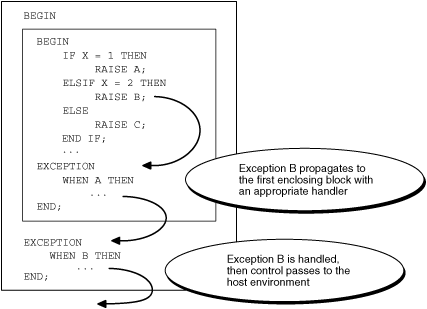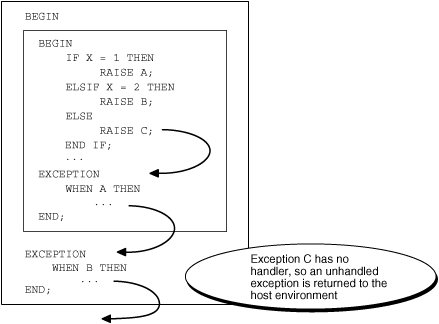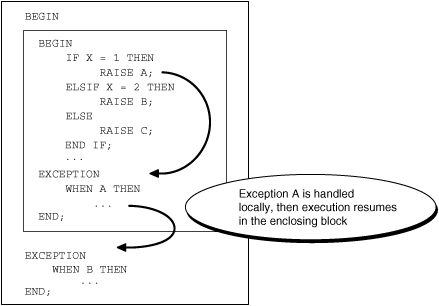Exception Propagation
If an exception is raised in a block that has no exception handler for it, then the exception propagates. That is, the exception reproduces itself in successive enclosing blocks until either a block has a handler for it or there is no enclosing block. If there is no handler for the exception, then PL/SQL returns an unhandled exception error to the invoker or host environment, which determines the outcome (for more information, see "Unhandled Exceptions").
In Figure 12-1, one block is nested inside another. The inner block raises exception A. The inner block has an exception handler for A, so A does not propagate. After the exception handler runs, control transfers to the next statement of the outer block.
In Figure 12-2, the inner block raises exception B. The inner block does not have an exception handler for exception B, so B propagates to the outer block, which does have an exception handler for it. After the exception handler runs, control transfers to the host environment.
Figure 12-2 Exception Propagates from Inner Block to Outer Block

Description of "Figure 12-2 Exception Propagates from Inner Block to Outer Block"
In Figure 12-3, the inner block raises exception C. The inner block does not have an exception handler for C, so exception C propagates to the outer block. The outer block does not have an exception handler for C, so PL/SQL returns an unhandled exception error to the host environment.
Figure 12-3 PL/SQL Returns Unhandled Exception Error to Host Environment

Description of "Figure 12-3 PL/SQL Returns Unhandled Exception Error to Host Environment"
A user-defined exception can propagate beyond its scope (that is, beyond the block that declares it), but its name does not exist beyond its scope. Therefore, beyond its scope, a user-defined exception can be handled only with an OTHERS exception handler.
In Example 12-14, the inner block declares an exception named past_due, for which it has no exception handler. When the inner block raises past_due, the exception propagates to the outer block, where the name past_due does not exist. The outer block handles the exception with an OTHERS exception handler.
If the outer block does not handle the user-defined exception, then an error occurs, as in Example 12-15.
Note:
Exceptions cannot propagate across remote subprogram invocations. Therefore, a PL/SQL block cannot handle an exception raised by a remote subprogram.
Topics
Example 12-14 Exception that Propagates Beyond Scope is Handled
CREATE OR REPLACE PROCEDURE p AUTHID DEFINER AS
BEGIN
DECLARE
past_due EXCEPTION;
PRAGMA EXCEPTION_INIT (past_due, -4910);
due_date DATE := trunc(SYSDATE) - 1;
todays_date DATE := trunc(SYSDATE);
BEGIN
IF due_date < todays_date THEN
RAISE past_due;
END IF;
END;
EXCEPTION
WHEN OTHERS THEN
ROLLBACK;
RAISE;
END;
/
Example 12-15 Exception that Propagates Beyond Scope is Not Handled
BEGIN
DECLARE
past_due EXCEPTION;
due_date DATE := trunc(SYSDATE) - 1;
todays_date DATE := trunc(SYSDATE);
BEGIN
IF due_date < todays_date THEN
RAISE past_due;
END IF;
END;
END;
/
Result:
BEGIN
*
ERROR at line 1:
ORA-06510: PL/SQL: unhandled user-defined exception
ORA-06512: at line 9Propagation of Exceptions Raised in Declarations
An exception raised in a declaration propagates immediately to the enclosing block (or to the invoker or host environment if there is no enclosing block). Therefore, the exception handler must be in an enclosing or invoking block, not in the same block as the declaration.
In Example 12-16, the VALUE_ERROR exception handler is in the same block as the declaration that raises VALUE_ERROR. Because the exception propagates immediately to the host environment, the exception handler does not handle it.
Example 12-17 is like Example 12-16 except that an enclosing block handles the VALUE_ERROR exception that the declaration in the inner block raises.
Example 12-16 Exception Raised in Declaration is Not Handled
DECLARE credit_limit CONSTANT NUMBER(3) := 5000; -- Maximum value is 999 BEGIN NULL; EXCEPTION WHEN VALUE_ERROR THEN DBMS_OUTPUT.PUT_LINE('Exception raised in declaration.'); END; /
Result:
DECLARE * ERROR at line 1: ORA-06502: PL/SQL: value or conversion error: number precision too large ORA-06512: at line 2
Example 12-17 Exception Raised in Declaration is Handled by Enclosing Block
BEGIN DECLARE credit_limit CONSTANT NUMBER(3) := 5000; BEGIN NULL; END; EXCEPTION WHEN VALUE_ERROR THEN DBMS_OUTPUT.PUT_LINE('Exception raised in declaration.'); END; /
Result:
Exception raised in declaration.
Propagation of Exceptions Raised in Exception Handlers
An exception raised in an exception handler propagates immediately to the enclosing block (or to the invoker or host environment if there is no enclosing block). Therefore, the exception handler must be in an enclosing or invoking block.
In Example 12-18, when n is zero, the calculation 1/n raises the predefined exception ZERO_DIVIDE, and control transfers to the ZERO_DIVIDE exception handler in the same block. When the exception handler raises ZERO_DIVIDE, the exception propagates immediately to the invoker. The invoker does not handle the exception, so PL/SQL returns an unhandled exception error to the host environment.
Example 12-19 is like Example 12-18 except that when the procedure returns an unhandled exception error to the invoker, the invoker handles it.
Example 12-20 is like Example 12-18 except that an enclosing block handles the exception that the exception handler in the inner block raises.
In Example 12-21, the exception-handling part of the procedure has exception handlers for user-defined exception i_is_one and predefined exception ZERO_DIVIDE. When the i_is_one exception handler raises ZERO_DIVIDE, the exception propagates immediately to the invoker (therefore, the ZERO_DIVIDE exception handler does not handle it). The invoker does not handle the exception, so PL/SQL returns an unhandled exception error to the host environment.
Example 12-22 is like Example 12-21 except that an enclosing block handles the ZERO_DIVIDE exception that the i_is_one exception handler raises.
Example 12-18 Exception Raised in Exception Handler is Not Handled
CREATE OR REPLACE PROCEDURE print_reciprocal (n NUMBER) AUTHID DEFINER IS
BEGIN
DBMS_OUTPUT.PUT_LINE(1/n); -- handled
EXCEPTION
WHEN ZERO_DIVIDE THEN
DBMS_OUTPUT.PUT_LINE('Error:');
DBMS_OUTPUT.PUT_LINE(1/n || ' is undefined'); -- not handled
END;
/
BEGIN -- invoking block
print_reciprocal(0);
END;
/
Result:
Error:
BEGIN
*
ERROR at line 1:
ORA-01476: divisor is equal to zero
ORA-06512: at "HR.PRINT_RECIPROCAL", line 7
ORA-01476: divisor is equal to zero
ORA-06512: at line 2
Example 12-19 Exception Raised in Exception Handler is Handled by Invoker
CREATE OR REPLACE PROCEDURE print_reciprocal (n NUMBER) AUTHID DEFINER IS
BEGIN
DBMS_OUTPUT.PUT_LINE(1/n);
EXCEPTION
WHEN ZERO_DIVIDE THEN
DBMS_OUTPUT.PUT_LINE('Error:');
DBMS_OUTPUT.PUT_LINE(1/n || ' is undefined');
END;
/
BEGIN -- invoking block
print_reciprocal(0);
EXCEPTION
WHEN ZERO_DIVIDE THEN -- handles exception raised in exception handler
DBMS_OUTPUT.PUT_LINE('1/0 is undefined.');
END;
/
Result:
Error:
1/0 is undefined.
Example 12-20 Exception Raised in Exception Handler is Handled by Enclosing Block
CREATE OR REPLACE PROCEDURE print_reciprocal (n NUMBER) AUTHID DEFINER IS
BEGIN
BEGIN
DBMS_OUTPUT.PUT_LINE(1/n);
EXCEPTION
WHEN ZERO_DIVIDE THEN
DBMS_OUTPUT.PUT_LINE('Error in inner block:');
DBMS_OUTPUT.PUT_LINE(1/n || ' is undefined.');
END;
EXCEPTION
WHEN ZERO_DIVIDE THEN -- handles exception raised in exception handler
DBMS_OUTPUT.PUT('Error in outer block: ');
DBMS_OUTPUT.PUT_LINE('1/0 is undefined.');
END;
/
BEGIN
print_reciprocal(0);
END;
/
Result:
Error in inner block:
Error in outer block: 1/0 is undefined.
Example 12-21 Exception Raised in Exception Handler is Not Handled
CREATE OR REPLACE PROCEDURE descending_reciprocals (n INTEGER) AUTHID DEFINER IS
i INTEGER;
i_is_one EXCEPTION;
BEGIN
i := n;
LOOP
IF i = 1 THEN
RAISE i_is_one;
ELSE
DBMS_OUTPUT.PUT_LINE('Reciprocal of ' || i || ' is ' || 1/i);
END IF;
i := i - 1;
END LOOP;
EXCEPTION
WHEN i_is_one THEN
DBMS_OUTPUT.PUT_LINE('1 is its own reciprocal.');
DBMS_OUTPUT.PUT_LINE('Reciprocal of ' || TO_CHAR(i-1) ||
' is ' || TO_CHAR(1/(i-1)));
WHEN ZERO_DIVIDE THEN
DBMS_OUTPUT.PUT_LINE('Error:');
DBMS_OUTPUT.PUT_LINE(1/n || ' is undefined');
END;
/
BEGIN
descending_reciprocals(3);
END;
/
Result:
Reciprocal of 3 is .3333333333333333333333333333333333333333
Reciprocal of 2 is .5
1 is its own reciprocal.
BEGIN
*
ERROR at line 1:
ORA-01476: divisor is equal to zero
ORA-06512: at "HR.DESCENDING_RECIPROCALS", line 19
ORA-06510: PL/SQL: unhandled user-defined exception
ORA-06512: at line 2
Example 12-22 Exception Raised in Exception Handler is Handled by Enclosing Block
CREATE OR REPLACE PROCEDURE descending_reciprocals (n INTEGER) AUTHID DEFINER IS
i INTEGER;
i_is_one EXCEPTION;
BEGIN
BEGIN
i := n;
LOOP
IF i = 1 THEN
RAISE i_is_one;
ELSE
DBMS_OUTPUT.PUT_LINE('Reciprocal of ' || i || ' is ' || 1/i);
END IF;
i := i - 1;
END LOOP;
EXCEPTION
WHEN i_is_one THEN
DBMS_OUTPUT.PUT_LINE('1 is its own reciprocal.');
DBMS_OUTPUT.PUT_LINE('Reciprocal of ' || TO_CHAR(i-1) ||
' is ' || TO_CHAR(1/(i-1)));
WHEN ZERO_DIVIDE THEN
DBMS_OUTPUT.PUT_LINE('Error:');
DBMS_OUTPUT.PUT_LINE(1/n || ' is undefined');
END;
EXCEPTION
WHEN ZERO_DIVIDE THEN -- handles exception raised in exception handler
DBMS_OUTPUT.PUT_LINE('Error:');
DBMS_OUTPUT.PUT_LINE('1/0 is undefined');
END;
/
BEGIN
descending_reciprocals(3);
END;
/
Result:
Reciprocal of 3 is .3333333333333333333333333333333333333333
Reciprocal of 2 is .5
1 is its own reciprocal.
Error:
1/0 is undefined